英语8种时态
英语中常见的八种基本时态
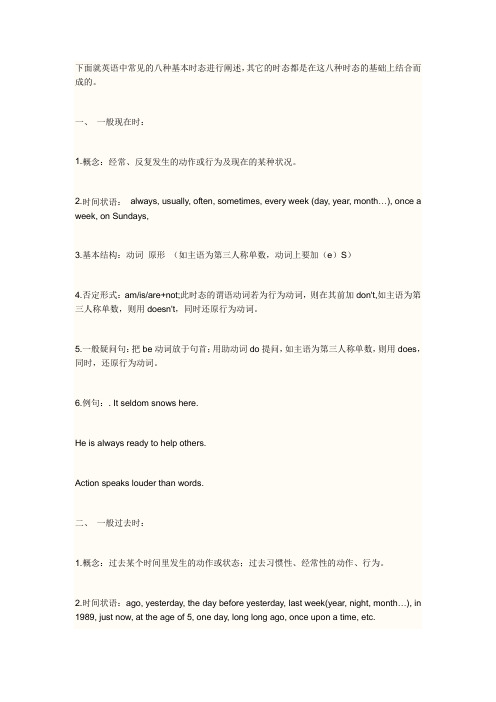
下面就英语中常见的八种基本时态进行阐述,其它的时态都是在这八种时态的基础上结合而成的。
一、一般现在时:1.概念:经常、反复发生的动作或行为及现在的某种状况。
2.时间状语:always, usually, often, sometimes, every week (day, year, month…), once a week, on Sundays,3.基本结构:动词原形(如主语为第三人称单数,动词上要加(e)S)4.否定形式:am/is/are+not;此时态的谓语动词若为行为动词,则在其前加don't,如主语为第三人称单数,则用doesn't,同时还原行为动词。
5.一般疑问句:把be动词放于句首;用助动词do提问,如主语为第三人称单数,则用does,同时,还原行为动词。
6.例句:. It seldom snows here.He is always ready to help others.Action speaks louder than words.二、一般过去时:1.概念:过去某个时间里发生的动作或状态;过去习惯性、经常性的动作、行为。
2.时间状语:ago, yesterday, the day before yesterday, last week(year, night, month…), in 1989, just now, at the age of 5, one day, long long ago, once upon a time, etc.3.基本结构:be动词;行为动词4.否定形式:was/were+not;在行为动词前加didn't,同时还原行为动词。
5.一般疑问句:was或were放于句首;用助动词do的过去式did 提问,同时还原行为动词。
6.例句:She often came to help us in those days.I didn't know you were so busy.三、现在进行时:1.概念:表示现阶段或说话时正在进行的动作及行为。
英语八大时态总结
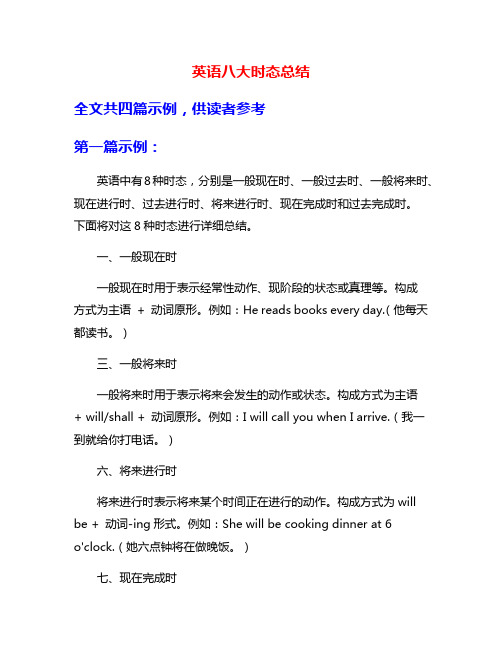
英语八大时态总结全文共四篇示例,供读者参考第一篇示例:英语中有8种时态,分别是一般现在时、一般过去时、一般将来时、现在进行时、过去进行时、将来进行时、现在完成时和过去完成时。
下面将对这8种时态进行详细总结。
一、一般现在时一般现在时用于表示经常性动作、现阶段的状态或真理等。
构成方式为主语+ 动词原形。
例如:He reads books every day.(他每天都读书。
)三、一般将来时一般将来时用于表示将来会发生的动作或状态。
构成方式为主语+ will/shall + 动词原形。
例如:I will call you when I arrive.(我一到就给你打电话。
)六、将来进行时将来进行时表示将来某个时间正在进行的动作。
构成方式为will be + 动词-ing形式。
例如:She will be cooking dinner at 6o'clock.(她六点钟将在做晚饭。
)七、现在完成时现在完成时用于表示过去某个时间开始的动作一直持续到现在,并可能继续发生。
构成方式为主语+ have/has + 过去分词。
例如:He has lived here for 5 years.(他在这里住了5年了。
)总结:1. 一般现在时表示经常性动作、现阶段的状态或真理。
2. 一般过去时表示过去某个时间发生的动作或状态。
3. 一般将来时表示将来会发生的动作或状态。
4. 现在进行时表示现在进行的动作或状态。
5. 过去进行时表示过去某个时间正在进行的动作。
6. 将来进行时表示将来某个时间将会进行的动作。
7. 现在完成时表示过去某个时间开始的动作一直持续到现在。
8. 过去完成时表示过去某个时间之前发生的动作。
掌握这8种时态的用法及构成方式对于学习英语语法和提高英语水平非常重要。
希望以上总结对您有所帮助。
第二篇示例:英语八大时态是学习英语语法非常重要的内容之一,掌握好各种时态的用法可以帮助我们更准确地表达自己的意思。
英语八大时态
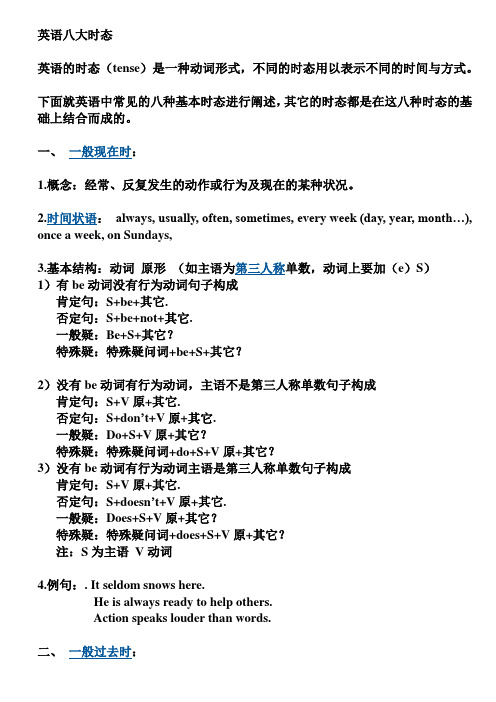
英语八大时态英语的时态(tense)是一种动词形式,不同的时态用以表示不同的时间与方式。
下面就英语中常见的八种基本时态进行阐述,其它的时态都是在这八种时态的基础上结合而成的。
一、一般现在时:1.概念:经常、反复发生的动作或行为及现在的某种状况。
2.时间状语:always, usually, often, sometimes, every week (day, year, month…), once a week, on Sundays,3.基本结构:动词原形(如主语为第三人称单数,动词上要加(e)S)1)有be动词没有行为动词句子构成肯定句:S+be+其它.否定句:S+be+not+其它.一般疑:Be+S+其它?特殊疑:特殊疑问词+be+S+其它?2)没有be动词有行为动词,主语不是第三人称单数句子构成肯定句:S+V原+其它.否定句:S+don’t+V原+其它.一般疑:Do+S+V原+其它?特殊疑:特殊疑问词+do+S+V原+其它?3)没有be动词有行为动词主语是第三人称单数句子构成肯定句:S+V原+其它.否定句:S+doesn’t+V原+其它.一般疑:Does+S+V原+其它?特殊疑:特殊疑问词+does+S+V原+其它?注:S为主语V动词4.例句:. It seldom snows here.He is always ready to help others.Action speaks louder than words.1.概念:过去某个时间里发生的动作或状态;过去习惯性、经常性的动作、行为。
2.时间状语:ago, yesterday, the day before yesterday, last week(year, night, month…), in 1989, just now, at the age of 5, one day, long long ago, once upon a time, etc.3.基本结构:be动词;行为动词1)有be动词没有行为动词句子构成肯定句:S+was/were+其它.否定句:S+was/were+not+其它.一般疑:Was/Were+S+其它?特殊疑:特殊疑问词+ was/were +S+其它?2) 没有be动词有行为动词句子构成肯定句:S+Ved+其它.否定句:S+didn’t+V原+其它.一般疑:Did+S+V原+其它?特殊疑:特殊疑问词+did+S+V原+其它?6.例句:She often came to help us in those days.I didn't know you were so busy.三、现在进行时:1.概念:表示现阶段或说话时正在进行的动作及行为。
8个初中英语时态

8个初中英语时态8个初中英语时态是学习英语语法的重要组成部分,以下是它们的定义和例句:1. 现在一般时态:表示现在的动作或状态。
例如:I eat an apple every day. (我每天吃一个苹果。
)2. 过去一般时态:表示过去的动作或状态。
例如:She studied English last year. (她去年学了英语。
)3. 现在进行时态:表示正在进行的动作或状态。
例如:He is watching TV now. (他正在看电视。
)4. 过去进行时态:表示过去某个时间正在进行的动作或状态。
例如:They were having dinner when I called. (我打电话的时候他们正在吃饭。
)5. 现在完成时态:表示已经完成的动作或状态,强调对现在的影响。
例如:I have learned English for three years. (我已经学了三年英语了。
)6. 过去完成时态:表示过去某个时间之前已经完成的动作或状态。
例如:They had finished their homework by the time I arrived. (我到的时候他们已经完成作业了。
)7. 现在完成进行时态:表示从过去开始一直持续到现在的动作或状态,强调对现在的影响。
例如:He has been studying English for five years. (他已经学了五年英语了。
)8. 过去完成进行时态:表示从过去某个时间开始一直持续到过去的动作或状态。
例如:They had been waiting for the bus for an hour when I arrived. (我到的时候他们已经等了一个小时的车了。
)。
英语语法的八大时态
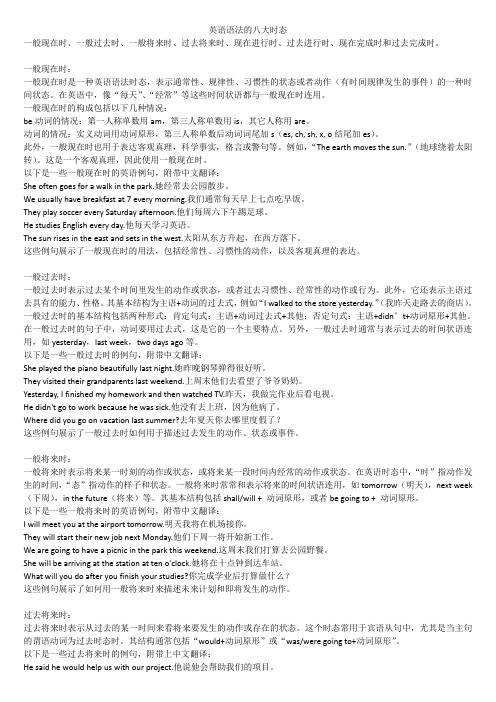
英语语法的八大时态一般现在时、一般过去时、一般将来时、过去将来时、现在进行时、过去进行时、现在完成时和过去完成时。
一般现在时:一般现在时是一种英语语法时态,表示通常性、规律性、习惯性的状态或者动作(有时间规律发生的事件)的一种时间状态。
在英语中,像“每天”、“经常”等这些时间状语都与一般现在时连用。
一般现在时的构成包括以下几种情况:be动词的情况:第一人称单数用am,第三人称单数用is,其它人称用are。
动词的情况:实义动词用动词原形,第三人称单数后动词词尾加s(es, ch, sh, x, o结尾加es)。
此外,一般现在时也用于表达客观真理,科学事实,格言或警句等。
例如,“The earth moves the sun.”(地球绕着太阳转)。
这是一个客观真理,因此使用一般现在时。
以下是一些一般现在时的英语例句,附带中文翻译:She often goes for a walk in the park.她经常去公园散步。
We usually have breakfast at 7 every morning.我们通常每天早上七点吃早饭。
They play soccer every Saturday afternoon.他们每周六下午踢足球。
He studies English every day.他每天学习英语。
The sun rises in the east and sets in the west.太阳从东方升起,在西方落下。
这些例句展示了一般现在时的用法,包括经常性、习惯性的动作,以及客观真理的表达。
一般过去时:一般过去时表示过去某个时间里发生的动作或状态,或者过去习惯性、经常性的动作或行为。
此外,它还表示主语过去具有的能力、性格。
其基本结构为主语+动词的过去式,例如“I walked to the store yesterday.”(我昨天走路去的商店)。
一般过去时的基本结构包括两种形式:肯定句式:主语+动词过去式+其他;否定句式:主语+didn’t+动词原形+其他。
英语语法八大时态总结
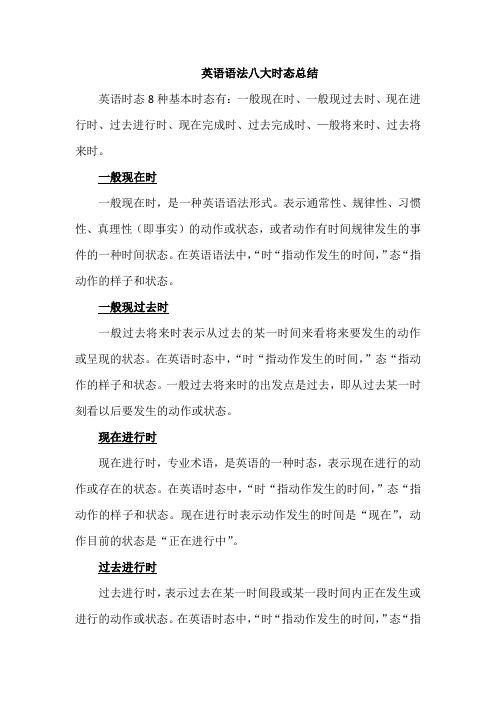
英语语法八大时态总结英语时态8种基本时态有:一般现在时、一般现过去时、现在进行时、过去进行时、现在完成时、过去完成时、—般将来时、过去将来时。
一般现在时一般现在时,是一种英语语法形式。
表示通常性、规律性、习惯性、真理性(即事实)的动作或状态,或者动作有时间规律发生的事件的一种时间状态。
在英语语法中,“时“指动作发生的时间,”态“指动作的样子和状态。
一般现过去时一般过去将来时表示从过去的某一时间来看将来要发生的动作或呈现的状态。
在英语时态中,“时“指动作发生的时间,”态“指动作的样子和状态。
一般过去将来时的出发点是过去,即从过去某一时刻看以后要发生的动作或状态。
现在进行时现在进行时,专业术语,是英语的一种时态,表示现在进行的动作或存在的状态。
在英语时态中,“时“指动作发生的时间,”态“指动作的样子和状态。
现在进行时表示动作发生的时间是“现在”,动作目前的状态是“正在进行中”。
过去进行时过去进行时,表示过去在某一时间段或某一段时间内正在发生或进行的动作或状态。
在英语时态中,“时“指动作发生的时间,”态“指动作的样子和状态。
现在完成时由“have/has+过去分词”构成,主要有两个含义:表示动作发生在过去,但与现在的情况有联系,有时无时间状语,有时和一些表示不确定的过去时间状语连用,如:many times,just,yet,ever,never,already,before,so far, by now等连用。
过去完成时过去完成时:表示过去某一时间或动作以前已经发生或完成了的动作,对过去的某一点造成的某种影响或是结果,用来指在另一个过去行动之前就已经完成了的事件。
在英语时态中,“时“指动作发生的时间,”态“指动作的样子和状态。
它表示动作发生的时间是“过去的过去”,侧重事情的结果。
—般将来时一般将来时表示将来某一时段的动作或状态,或将来某一段时间内经常的动作或状态。
在英语时态中,“时“指动作发生的时间,”态“指动作的样子和状态。
英语八种时态定义

英语八种时态定义、结构、用法英语的时态(tense)是一种动词形式,不同的时态用以表示不同的时间与方式。
下面就英语中常见的八种基本时态进行阐述,其它的时态都是在这八种时态的基础上结合而成的。
一、一般现在时:1.概念:经常、反复发生的动作或行为及现在的某种状况。
2.时间状语:always, usually, often, sometimes, every week (day, year, mo nth...), once a week, on Sundays,3.基本结构:动词原形(如主语为第三人称单数,动词上要加(e)S)4.否定形式:am/is/are+not;此时态的谓语动词若为行为动词,则在其前加don’t,如主语为第三人称单数,则用doesn’t,通常还原行为动词。
5.一般疑问句:把be动词放于句首;用助动词do提问,如主语为第三人称单数,则用does,同时,还原行为动词。
6.例句:It seldom snows here.He is always ready to help others.Action speaks louder than words.二、一般过去时:1.概念:过去某个时间里发生的动作或状态;过去习惯性、经常性的动作、行为。
2.时间状语:ago, yesterday, the day before yesterday, last week(year, nig ht, month…), in 1989, just now, at the age of 5, on e day, long long ago, once upon a time, etc.3.基本结构:be动词;行为动词4.否定形式:was/were+not;在行为动词前加didn’t,同时还原行为动词。
5.一般疑问句:was或were放于句首;用助动词do的过去式did 提问,同时还原行为动词。
6.例句:She often came to help us in those days.I didn’t know you were so busy.三、现在进行时:1.概念:表示现阶段或说话时正在进行的动作及行为。
英语语中常见的时态有8种

语中常见的时态有8种--- 一般现在时/一般过去时;现在进行时/过去进行时;一般将来时/过去将来时;现在完成时/过去完成时。
另外还有现在完成进行时/过去完成进行时,将来完成时,将来进行时。
一关于一般现在时(第三人称动词后加” s” 或“es” )(1)表示经常性、习惯性动作。
(2)普遍真理、自然现象,谚语、报刊标题等(3)代替将来时(主从句均为将来时时,代替从句中的将来时)(4)以here ,there 开头的句子中,动词go come 等用现在时代替进行时Here comes the bus. There goes the bell.二关于一般过去时(谓语构成: V +ed, 注意不规则动词的构成)(1)表过去经常性、习惯性动。
(注意比较would do/ used to do )She often came to visit us when she was there.Whenever I went to Beijing, he would come to guide me.(2) 过去某一时刻发生的动作。
三关于现在进行时(am/is/are + ving)(1) 表示此时此刻或现阶段正在进行的动作。
How are getting along with your studies these days?More and more people are giving up smoking.(2) 表将来,用于从句中,可代替将来时。
常用于瞬间动词,如come, go, leave, arrive, die 等,常表示渐进或安排要进行的动作。
If she is doing her homew ork, don’t interrupt her.He is dying.注意:系动词look, feel, taste, smell, sound, prove,等及心理活动的动词want, mean, mind, hope, understand, know, like, dislike ,love, prefer, hate ,doubt等一般不用进行时。
英语八种时态一览表
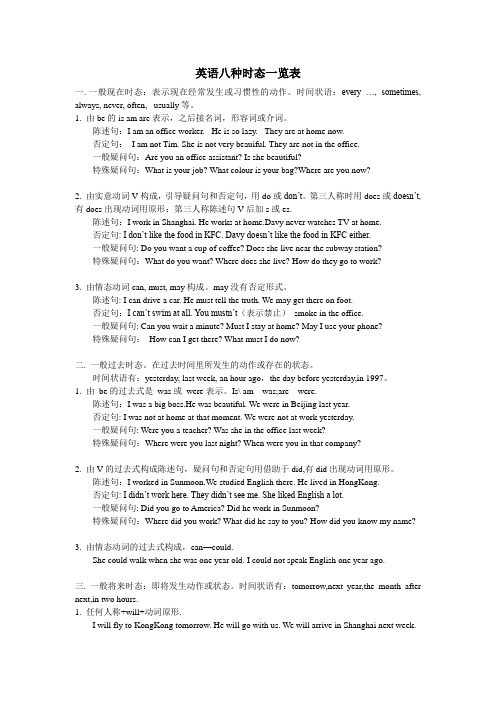
英语八种时态一览表一. 一般现在时态:表示现在经常发生或习惯性的动作。
时间状语:every …, sometimes, always, never, often, usually等。
1. 由be的is am are表示,之后接名词,形容词或介词。
陈述句:I am an office worker. He is so lazy. They are at home now.否定句:I am not Tim. She is not very beauiful. They are not in the office.一般疑问句:Are you an office assistant? Is she beautiful?特殊疑问句:What is your job? What colour is your bag?Where are you now?2. 由实意动词V构成,引导疑问句和否定句,用do或don’t。
第三人称时用does或doesn’t,有does出现动词用原形;第三人称陈述句V后加s或es.陈述句:I work in Shanghai. He works at home.Davy never watches TV at home.否定句: I don’t like the food in KFC. Davy doesn’t like the food in KFC either.一般疑问句: Do you want a cup of coffee? Does she live near the subway station?特殊疑问句:What do you want? Where does she live? How do they go to work?3. 由情态动词can, must, may构成。
may没有否定形式。
陈述句: I can drive a car. He must tell the truth. We may get there on foot.否定句:I can’t swim at all. Y ou mustn’t(表示禁止)smoke in the office.一般疑问句: Can you wait a minute? Must I stay at home? May I use your phone?特殊疑问句:How can I get there? What must I do now?二. 一般过去时态。
英语八大时态结构_含例句

时态(8个):一般现在时: 经常或习惯性的动作结构: 肯定句主语+be (am, is, are ) + 其他 eg: I am Chinese.否定句主语+be not +其他 eg: I am not a boy.疑问句 Be+主语+其他 eg: Are you a girl?或: 肯定句主语+动原+其他 (三单作主语动词要变形)eg: I (He) often get (gets) up early.否定句主语+don't+动原+其他 (三单作主语don't变doesn't)eg: I (She) don’t (doesn’t) like him.疑问句 DO+主语+动原+其他 (三单作主语do变does)eg: Do (Does) you (she) like playing baseball?关键词: sometimes=at times有时,often经常, usually通常, always总是,every day每天, on Sunday afternoon在周日下午, five days a week一周五天, three times a month 一个月三次…现在进行时: 正在发生的动作结构: 肯定句主语+be+动词的现在分词(ing)+其他 eg: I am reading now.否定句主语+be not+动词的现在分词(ing)+其他 eg: I am not working.疑问句 Be +主语+动词的现在分词+其他 eg: Are you sleeping?关键词:now现在, at the moment此刻, look, listen, keep quiet等提示语.一般将来时: 将要发生的动作结构: 肯定句主语+will+动词原型+其他 eg: I will call you later.否定句主语+will not +动词原型+其他 eg: I will not go to the park.疑问句 Will +主语+动词原型+其他 Will you go shopping with her?(will 可改为be going to ,当主语是第一人称时will可用shall)关键词:tomorrow, next year明年, tonight今晚, this year今年, at the end of this term这学期期末, from now on从现在开始, soon一会儿马上, later后稍后,in three days三天之内, in the future 未来…一般过去时: 过去发生的动作强调时间句子结构:肯定句主语+be(was,were)+其他 eg: I was born on July.1st, 2000.否定句主语+be not+其他 eg: I was not born in 1999.疑问句 Be+主语+其他 eg: Were you born in January?或: 肯定句主语+动词的过去式(ed)+其他 Lily went shopping yesterday.否定句主语+did not+动原+其他 eg: He did not go to school today.疑问句 Did+主语+动原+其他eg:Did she pass the test?关键词:yesterday昨天,last week上周, last year去年, 一段时间+ago如ten years ago十年前 five hours ago五小时前, in +年/月,on+具体日期...Just now=a moment ago刚才,in the old days从前, long ago很久以前...过去进行时: 过去正在发生的动作结构: 肯定句主语+was/were+动词的现在分词+其他eg: I was doing my homework at 8 o’clock yesterday evening.否定句主语+was/were not +动词的现在分词+其他They were not staying at home at this moment last Sunday.疑问句 Was/Were + 主语+ 动词的现在分词+其他Were you sleeping when I called you last night?关键词:具体时间如:at ten o'clock yesterday morning, at this moment last Sunday上周日的这个时候...现在完成时: 过去发生的动作对现在造成的影响强调动作或其产生的结果结构:肯定句主语+have/has+动词的过去分词+其他(三单变成has)eg: This year alone, we've already planted ten thousand trees否定句主语+have/has not+动词的过去分词+其他eg: He has not arrived at home yet.疑问句 Have/Has +主语+动词的过去分词+其他eg: Have you been to China?关键词:already已经, yet还, just刚刚, ever曾经, never从不,so far目前, for +一段时间,since+过去的具体时间,this year alone今年以来,these five years alone这五年以来",in the last ten years 在过去的十年中…过去将来时:结构: 肯定句主语+ would+动原+其他 eg: I didn't know if he would come.否定句主语+ would not +动原+其他eg: They were not going to go hiking unless they finished their homework.疑问句 Would+主语+动词原型+其他 (would you like是词组一个固定搭配一般用表示礼貌的问)eg: Would you like to have a dinner with me?(would可改为was/were going to ,主语第一人称时would也可以用should)过去完成时:结构: 肯定句主语+had +动词的过去分词+其他eg: Mr. Smith died yesterday. He had been a good friend of mine.否定句主语+had not +动词的过去分词+其他eg: He said he has not been to America.疑问句 Had+主语+动词的过去分词+其他eg: Had he completed his homework by the time you got there.关键词: 句子中的两个动作都发生在过去一、一般现在时:概念:经常、反复发生的动作或行为及现在的某种状况。
英语最常用的8种时态

英语最常用的8种时态英语最常用的8种时态:一般现在时、一般现过去时、现在进行时、过去进行时、现在完成时、过去完成时、—般将来时、过去将来时。
1、一般现在时一般现在时,是一种英语语法形式。
表示通常性、规律性、习惯性、真理性(即事实)的动作或状态,或者动作有时间规律发生的事件的一种时间状态。
在英语语法中,“时“指动作发生的时间,”态“指动作的样子和状态。
2、一般现过去时一般过去将来时表示从过去的某一时间来看将来要发生的动作或呈现的状态。
在英语时态中,“时“指动作发生的时间,”态“指动作的样子和状态。
一般过去将来时的出发点是过去,即从过去某一时刻看以后要发生的动作或状态。
3、现在进行时现在进行时,专业术语,是英语的一种时态,表示现在进行的动作或存在的状态。
在英语时态中,“时“指动作发生的时间,”态“指动作的样子和状态。
现在进行时表示动作发生的时间是“现在”,动作目前的状态是“正在进行中”。
4、过去进行时过去进行时,表示过去在某一时间段或某一段时间内正在发生或进行的动作或状态。
在英语时态中,“时“指动作发生的时间,”态“指动作的样子和状态。
5、现在完成时由“have/has+过去分词”构成,主要有两个含义:表示动作发生在过去,但与现在的情况有联系,有时无时间状语,有时和一些表示不确定的过去时间状语连用,如:many times,just,yet,ever,never,already,before,so far, by now等连用。
6、过去完成时过去完成时:表示过去某一时间或动作以前已经发生或完成了的动作,对过去的某一点造成的某种影响或是结果,用来指在另一个过去行动之前就已经完成了的事件。
在英语时态中,“时“指动作发生的时间,”态“指动作的样子和状态。
它表示动作发生的时间是“过去的过去”,侧重事情的结果。
7、—般将来时一般将来时表示将来某一时段的动作或状态,或将来某一段时间内经常的动作或状态。
在英语时态中,“时“指动作发生的时间,”态“指动作的样子和状态。
英语八个时态结构

英语八个时态结构
1. 简单现在时(Simple Present T ense):主语+动词原形
例如:She drinks coffee every morning.
2. 现在进行时(Present Continuous Tense):主语+am/is/are+动名词例如:He is studying for his exams right now.
3. 简单过去时(Simple Past Tense):主语+动词过去式
例如:They visited Paris last year.
4. 过去进行时(Past Continuous Tense):主语+was/were+动名词
例如:I was sleeping when you called me.
5. 现在完成时(Present Perfect Tense):主语+have/has+动词过去分词例如:She has already finished her homework.
6. 过去完成时(Past Perfect Tense):主语+had+动词过去分词
例如:By the time I arrived, they had already left.
7. 将来进行时(Future Continuous Tense):主语+will be+动名词
例如:This time next week, I will be studying for my exams.
8. 将来完成时(Future Perfect Tense):主语+will have+动词过去分词例如:By the end of the year, I will have finished my project.。
初中英语八大时态总结
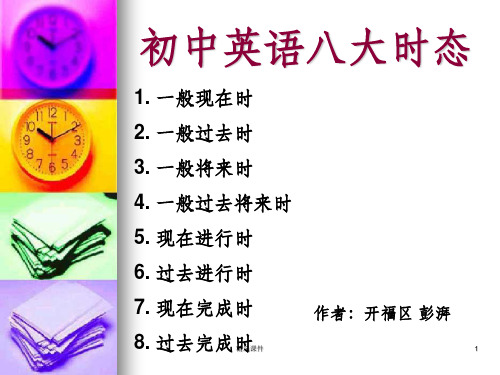
3. 一般将来时
will 加原型。
4. 一般过去将来时 would 加原型。
5. 现在进行时 6. 过去进行时 7. 现在完成时 8. 过去完成时精选课件
am/ is/ are +ing。 was/ were +ing。 have/ has + ed。 had + ed。
10
一般现在时 一般现在时,在没有be动词和助动词have,has,
一般现在时
精选课件
19
我昨天踢足球了。
一般过去时
精选课件
20
两星期前我说 过我将踢足球。
一般过去将来时
精选课件
21
我现在正 在踢足球。
现在进行时
精选课件
22
昨天的这个时候 我正在踢足球。
过去进行时
精选课件23Fra bibliotek我已经踢完足球了。
现在完成时
精选课件
24
昨天,你见到我 的时候,我早就 踢完足球了。
精选课件
8
过去完成时
含义:有两个过去时,其中一 个过去时比另一个过去时还要 过去,即一个动作发生在“过 去的过去”。 例如:昨天下午 我走进教室的时候同学们早就 坐好了、昨天当我走进电影院 的时候电影早就开始了。·
精选课件
9
初中英语八大时态
1. 一般现在时 2. 一般过去时
三单s,es其它无变化。 词尾加ed。
否: I did’t work here.
问:Did you work here?
答:Yes, I did./ No, I didn’t.
精选课件
12
一般将来时
肯: I wil work here.
英语的8种时态

英语的8种时态1. 简单现在时 (Simple Present Tense): 表示经常性或习惯性的动作,或客观事实。
例句: He works in a company.(他在一家公司工作。
)2. 现在进行时 (Present Continuous Tense): 表示现在正在进行的动作。
例句: She is studying for her exams.(她正在为考试而学习。
)3. 现在完成时 (Present Perfect Tense): 表示过去发生的动作对现在产生的影响或结果。
例句: I have finished my homework.(我已经完成了我的作业。
)4. 现在完成进行时 (Present Perfect Continuous Tense): 表示过去一直延续到现在的动作。
例句: They have been playing football for two hours.(他们已经踢了两个小时的足球。
)5. 简单过去时 (Simple Past Tense): 表示过去发生的动作或状态。
例句: She visited her grandparents last weekend.(她上周末去看望了她的祖父母。
)6. 过去进行时 (Past Continuous Tense): 表示过去某个时刻正在进行的动作。
例句: We were watching a movie when the power went out.(当停电时,我们正在看电影。
)7. 过去完成时 (Past Perfect Tense): 表示过去某个时间之前已经发生的动作。
例句: He had already left when I arrived.(我到达时,他已经离开了。
)8. 过去完成进行时 (Past Perfect Continuous Tense): 表示过去一直延续到过去某个时间的动作。
例句: She had been working in that company for 10 years before she retired.(她在退休前已经在那家公司工作了10年。
初中英语八种时态归纳
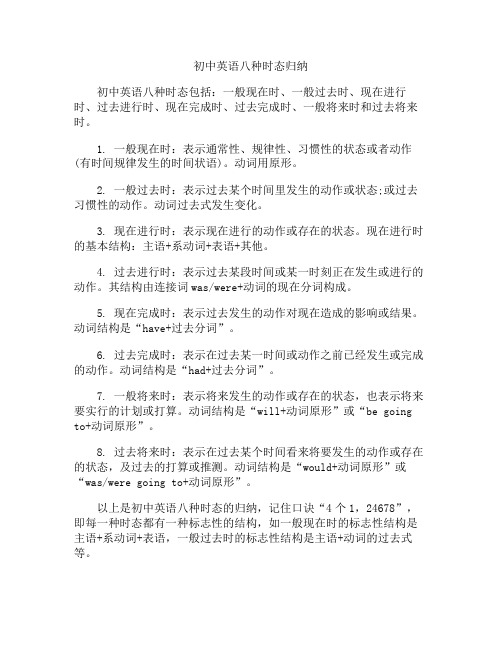
初中英语八种时态归纳
初中英语八种时态包括:一般现在时、一般过去时、现在进行时、过去进行时、现在完成时、过去完成时、一般将来时和过去将来时。
1. 一般现在时:表示通常性、规律性、习惯性的状态或者动作(有时间规律发生的时间状语)。
动词用原形。
2. 一般过去时:表示过去某个时间里发生的动作或状态;或过去习惯性的动作。
动词过去式发生变化。
3. 现在进行时:表示现在进行的动作或存在的状态。
现在进行时的基本结构:主语+系动词+表语+其他。
4. 过去进行时:表示过去某段时间或某一时刻正在发生或进行的动作。
其结构由连接词was/were+动词的现在分词构成。
5. 现在完成时:表示过去发生的动作对现在造成的影响或结果。
动词结构是“have+过去分词”。
6. 过去完成时:表示在过去某一时间或动作之前已经发生或完成的动作。
动词结构是“had+过去分词”。
7. 一般将来时:表示将来发生的动作或存在的状态,也表示将来要实行的计划或打算。
动词结构是“will+动词原形”或“be going to+动词原形”。
8. 过去将来时:表示在过去某个时间看来将要发生的动作或存在的状态,及过去的打算或推测。
动词结构是“would+动词原形”或“was/were going to+动词原形”。
以上是初中英语八种时态的归纳,记住口诀“4个1,24678”,即每一种时态都有一种标志性的结构,如一般现在时的标志性结构是主语+系动词+表语,一般过去时的标志性结构是主语+动词的过去式等。
英语的八种时态

英语的八种时态1.一般现在时2.一般过去时3.一般将来时4.现在进行时5.过去进行时6.现在完成时7.过去完成时8.过去将来时•一般现在时He goes to school every day.•一般过去时He went to school last morning.•一般将来时He will go to school tomorrow.•一般过去将来时He said he would go to school the next day.•现在进行时He is doing his homework now.•过去进行时He was doing his homework when somebody telephoned him.•现在完成时He has already finished his homework.•过去完成时He had finished his homework before his mother came back.•表示现阶段经常或习惯发生的动作或存在的状态,或说明主语的特征。
①一般现在时句子中常有的时间状语:often,usually,sometimes,always,every (day等),once/twice,a (week等), on (Sunday等),never,in the (morning等)。
如:They go to the Palace Museum once a year.(他们每年去一次故宫)/ They often discuss business in the evening.(他们经常在晚上商谈生意)②表示客观真理、事实、人的技能或现在的状态时句子里一般不用时间状语。
如:The earth turns round the sun.(地球绕着太阳转)/ Light travels faster than sound.(光传播比声音快)③表示十分确定会发生(如安排好的事情)或按照时间表进行的事情,用一般现在可以表达将来,句子中可以有将来时间。
八大时态的结构与用法

八大时态的结构与用法
英语中主要有八大时态,它们的结构和用法如下:
- 现在时:表示经常性或习惯性的动作或状态,或者表示现在正在进行的动作。
常用的句式结构是:主语+动词原形+其他。
- 现在进行时:表示正在进行的动作,或者现在的某个动作正在发生。
常用的句式结构是:主语+be动词(am/is/are)+动词的现在分词+其他。
- 现在完成时:表示过去某个时间开始,一直持续到现在的动作或状态。
常用的句式结构是:主语+have/has+动词的过去分词+其他。
- 过去时:表示过去某个具体时间发生的动作或状态。
常用的句式结构是:主语+动词的过去式+其他。
- 过去进行时:表示过去某个具体时间正在进行的动作。
常用的句式结构是:主语+was/were+动词的现在分词+其他。
- 过去完成时:表示过去某个时间之前完成的动作。
常用的句式结构是:主语+had+动词的过去分词+其他。
- 将来时:表示将来某个时间会发生的动作或状态。
常用的句式结构是:主语+will+动词原形+其他。
- 将来进行时:表示将来某个具体时间正在进行的动作。
常用的句式结构是:主语+will be+动词的现在分词+其他。
英语8种时态归纳表
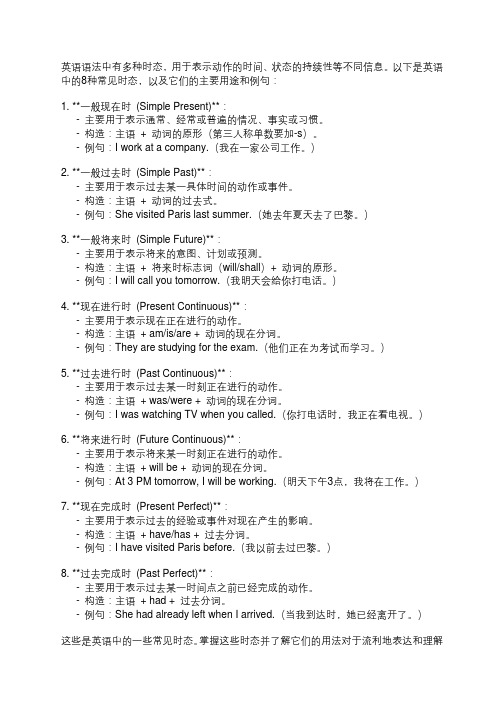
英语语法中有多种时态,用于表示动作的时间、状态的持续性等不同信息。
以下是英语中的8种常见时态,以及它们的主要用途和例句:1. **一般现在时(Simple Present)**:- 主要用于表示通常、经常或普遍的情况、事实或习惯。
- 构造:主语+ 动词的原形(第三人称单数要加-s)。
- 例句:I work at a company.(我在一家公司工作。
)2. **一般过去时(Simple Past)**:- 主要用于表示过去某一具体时间的动作或事件。
- 构造:主语+ 动词的过去式。
- 例句:She visited Paris last summer.(她去年夏天去了巴黎。
)3. **一般将来时(Simple Future)**:- 主要用于表示将来的意图、计划或预测。
- 构造:主语+ 将来时标志词(will/shall)+ 动词的原形。
- 例句:I will call you tomorrow.(我明天会给你打电话。
)4. **现在进行时(Present Continuous)**:- 主要用于表示现在正在进行的动作。
- 构造:主语+ am/is/are + 动词的现在分词。
- 例句:They are studying for the exam.(他们正在为考试而学习。
)5. **过去进行时(Past Continuous)**:- 主要用于表示过去某一时刻正在进行的动作。
- 构造:主语+ was/were + 动词的现在分词。
- 例句:I was watching TV when you called.(你打电话时,我正在看电视。
)6. **将来进行时(Future Continuous)**:- 主要用于表示将来某一时刻正在进行的动作。
- 构造:主语+ will be + 动词的现在分词。
- 例句:At 3 PM tomorrow, I will be working.(明天下午3点,我将在工作。
英语八大时态

一、一般现在时:1、表示:(1)经常做的事(2)习惯性动作(反复发生的动作)(3)客观事实和不变的真理(4)目前存在的状态(5)主语现在的性格、特征、能力2、基本结构: 肯定句:(1)主语 (I,We, You, They) + 动词原形 + ...(2)主语 (He,She,It) + 动词第三人称单数 + ...(3)主语 + be(am,is, are) + ...否定句:(1)主语(I,We, You, They)+ don’t + 动词原形 + ...(2)主语 (He,She,It) + doesn’t + 动词第三人称单数 + ...(3)主语 + be(am,is, are) + not + ...疑问句:(1)Do + 主语 (I,We, You, They) + 动词原形 + ...(2)Does + 主语 (He,She,It) + 动词第三人称单数+ ...(3)be(am,is, are) +主语 + ...3、时间状语:always总是,usually通常,often经常,sometimes有时,seldom很少,hardly几乎不,scarcely几乎不,every day每天,once a week每周一次,yearly每年,monthly每月,等时间状语或频率副词连用。
4、常和一般现在时连用的固定表达法:I promise...我允诺...,I apologize...我道歉...,I advise...我建议...,I insist...我强调...,I agree...我同意...,I refuse...我拒绝...,I suggest...我建议...如:I promise that I won’t be late again. 我答应不再迟到。
I suggest he set off at once. 我建议他应马上出发。
二、现在进行时:1、表示:(1)说话时正在进行的事情和动作.(2)现阶段正在进行的事情和动作.2、基本结构: 主语 + am, is, are + 动词ing + ...3、时间状语: now, at this time, these days, look, listen三、一般过去时:1、表示:(1)过去某时发生的事情和动作(2)过去习惯性动作或行为(3)过去经常性的动作或行为(句末常有表示过去的时间短语)2、基本结构:(1)主语 + 动词过去式 +...(2)主语 + was/were + ...3、时间状语:…ago, yesterday, the day before yesterday, last week(year,night, month…), in 1989, just now, at the age of 5, oneday, at last, at first, finally四、现在完成时;1、表示:(1)过去发生已经完成的动作,对现在赞成的影响或结果。
- 1、下载文档前请自行甄别文档内容的完整性,平台不提供额外的编辑、内容补充、找答案等附加服务。
- 2、"仅部分预览"的文档,不可在线预览部分如存在完整性等问题,可反馈申请退款(可完整预览的文档不适用该条件!)。
- 3、如文档侵犯您的权益,请联系客服反馈,我们会尽快为您处理(人工客服工作时间:9:00-18:30)。
初中英语八种时态归纳复习时态是英语学习中一个至关重要的内容,广大初中学生在实际运用时,往往对时态问题倍感棘手,下面我们就归纳复习一下这几种时态。
一、一般现在时(一)定义表示经常性或习惯性的动作,或存在的状态,还表示主语具备的性格和能力及客观真理。
例:I get up at 6:30 in the morning . She is at home .(二)构成主要用动词原形表示,当主语是第三人称单数时,在动词词尾加s/es。
(三)句型1、肯定句:主语+谓语+其他。
She reads English everyday .2、否定句:主语+don' t/doesn ' t+谓语+其他。
He doesn' t get up at 6:30 in the morning .3、一般疑问句:Do/Does+主语+V原+其他?Do you like English ? Yes ,I do ./No, I d'ont .4特殊疑问句:特殊疑问词+do/does+主语+V原+其他?What time do you get up every morning ? Where does your father work ? (三)用法1、表示经常性或习惯性的动作,或存在的状态,带与表示频率的时间状语如:often , sometimes , usually ,always , everyday year ,month . . . ), on ce/twice a week (month , year , etc.) , seldom , on Sun days 等连用。
I leave home for school at seven every morning .2、表示客观真理,科学事实、格言警句。
The sun rises in the east 日出东方。
The earth goes around the sun 地. 球绕着太阳转。
Ten mi nus two is eight 十减二等于八。
Light travels faster than sound 光. 的速度比声音的速度快。
The United States lies by the west coast of the Pacific Ocea美国位于太平洋西岸。
3、根据英文语法规定,当主句的谓语动词是一般将来时,那么时间或条件状语从句的谓语动词只能用一般现在时来表示将来要发生的动作。
I'll tell him the news when he comes back. 他回来时,我将告诉他这个消息。
If you come this afternoon,we' ll have a meeting .4、仅为了描述状态、性质、特征、能力等等。
这里的目的是为了"描述现阶段的动作或状态",其重点"不是强调动作发生的时间、或进行的状态"。
例如:He can speak five foreig n Ian guages他能说五种外语。
That is a beautiful city .那是座美丽的城市。
Changjiang River is one of the longest rivers in the world.She majors in music 她主修音乐。
All my family love football .我全家人都喜欢足球。
My sister is always ready to help others .我妹妹总是乐于助人。
(四)动词第三人称单数形式变化规则1、一般情况下,动词后直接加-S;如:help-helps ,clean-cleans ,give-give等。
2、以s,x,ch,sh或o结尾的动词,在词尾加-es;如:dress-dresses,fix-fixes,watch-watches,finish-finishe等。
3、以辅音字母加y结尾的动词,把y变为i,再加-es;如: study--studies,fly-flies,carry--carries等。
4、动词have遇在主语是第三人称单数时,have改为has,如: He has an interesting book .5、动词be遇有主语是第一人称单数时,be改为am,遇有主语是第人称时,be改为are,遇有主语是第三人称单数时,be改为is 用动词的适当形式填空1.1 like ____________ (swim).2. He ________ (read) En glish every day.3. We _______ (go)to school at seve n in the morni ng.4. Mike ______ (go)to school at seve n in the morni ng.5. My mother ______ (like) ______ (go) shopp ing.6.1 can ________ (draw) many beautiful pictures.7.She _________ (make) a model pla ne.8. Do you _______ (like) ________ (run)?9. Does he ________ (like) _______ (jump) ?10. Does Nancy _______ (grow)flowers on Saturday ?11. The teachers _______ (like) ___________(dan ce).12. The teacher ______ (like) ____________(dan ce).13. The students _________ (speak) En glish in class.14. The student ________ (speak) Chin ese after class.15. He ____________ l ike swim ming . ( not )二、一般过去时(一)结构一般过去时用动词的过去式表示。
注:在一般过去时的句子中,谓语动词可分为两类一类是be动词,其形式为was 与第一、三人称单数连用,were与第二人称和复数人称的主语连用。
凡是由be动词做谓语的句子,变否定句时,直接在其后加not,即wasn' t或weren' t,变一般疑问句将was/ were放在句首,句末用问号。
另一类谓语动词是由行为动词来充当,如stayed\went\visited等,这一类动词做谓语时,可与任何人称连用,句子变否定时,要在主语后面,动词的前面加didn' t,动词用原形;一般疑问句是把did 提到句首,动词用原形。
I was in Shan ghai last year .I was n' t in Shan ghai last year .Was you in Sha nghai last year ?He went to the park yesterday .He did n' t go to the park yesterday ?Did he go to the park yesterday ?(二)句式1肯定句:主语+动词过去式+其他。
I was in Beiji ng yesterday . I went to the beach yesterday .2、否定句:主语+wasn' t或weren' t+其他。
主语+did n' t + V原+其他。
I was n' t in Beiji ng yesterday . I dicfn t go to the beach yesterday .3、一般疑问句:was/ were+主语+V原+其他?Did +主语+V原+其他?Were you in Beiji ng yesterday ? Did you go to the beach yesterday ?4特殊疑问句:特殊疑问词+ was/ were+主语+其他?特殊疑问词+did+主语+V原+其他?Where were you yesterday ? Where did yougo yesterday ? (三)用法1表示过去某一时刻或某一段时间里所发生的动作或情况,常与明确的时间状语连用,女口:yesterday,last week(month , year …),-ago,the other day ,just now ,at the age o…,in 1980 等连用。
如:At the age of ten ,she began to learn to play the piano .2、表示过去经常发生或反复发生的动作,常与表示频度的时间状语连用。
When I was a child ,I ofte n play the football in the street .3、在时间、条件状语从句中,常用一般过去时态代替过去将来时。
He said he wouldn' t go if it rained .(四)动词过去式的规则变化1) 一般情况下,在动词原形末尾加-ed如look-looked2) 结尾是字母e的动词加-d,女口practice-practiced;3) 结尾是一辅音字母+y II的动词,变一y II为一i II再加ed,如study studied;4) 重读闭音节结尾,双写动词尾的辅音字母,再加ed,如stop stopped用所给动词的适当形式填空1. We all ________ (have) a good time last ni ght.2. Hele n ________ (milk) a cow on Friday.3. She likes _________n ewspapers, but she ________ a book yesterday. (read)4. He _______ f ootball now, but they _______ b asketball just now. (play)5. Jim's mother _________ (pla nt) trees just now.6. ______ they ________ (sweep) the floor on Sun day? No, they ________ .7. I ______ (watch) a carto on on Mon day.8 We ___ (go) to school on Sun day.9. It ___ (be) the 2nd of November yesterday. Mr White ___ (go) to his office by car.10. Gao Sha n _______ (put) the book on his head a mome nt ago.三、一般将来时(一)概念表示将要发生的动作或存在的状态。
